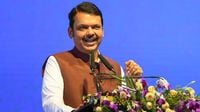On April 17, 2025, the Bombay High Court's Nagpur Bench issued summons to Maharashtra Chief Minister Devendra Fadnavis regarding a petition challenging his victory in the 2024 elections for the Nagpur South-West assembly seat. The petition, filed by Congress leader Prafulla Vinodrao Gudadhe, contends that Fadnavis's win was marred by procedural lapses and corrupt practices that warrant the court's intervention.
Gudadhe, who contested against Fadnavis in the November 2024 elections, lost by a significant margin of 39,710 votes. His legal team is seeking to have the High Court declare Fadnavis's victory "null and void," citing that several mandatory electoral rules were not adhered to during the election process.
The summons, issued by Justice Pravin S. Patil, is returnable on May 8, 2025. This legal action comes amidst a political backdrop where the Mahayuti alliance, led by the Bharatiya Janata Party (BJP), secured a sweeping victory by winning 230 out of 288 seats in the Maharashtra assembly elections, paving the way for Fadnavis's continued role as chief minister.
In addition to Fadnavis, the High Court has also issued summons to two other BJP MLAs—Mohan Mate from Nagpur South and Kirtikumar Bhangdia from Chimur in Chandrapur district—who are facing similar election petitions. This indicates a broader scrutiny of the electoral process in the region and raises questions about the integrity of the recent elections.
Gudadhe's petition highlights concerns over the electoral conduct that could potentially undermine the democratic process in Maharashtra. As the political landscape continues to evolve, the implications of this case could resonate beyond the immediate parties involved, affecting public confidence in electoral integrity.
The summons issued to Fadnavis and other BJP members underscores a critical moment in Maharashtra's political arena, where electoral challenges are becoming increasingly common. Legal experts suggest that the outcome of this case may set a precedent for future election disputes in the state.
The Maharashtra assembly elections of November 2024 were marked by intense campaigning and significant voter turnout, reflecting the electorate's engagement with pressing local issues. However, allegations of malpractice have cast a shadow over the results, prompting calls for thorough investigations into the conduct of the elections.
As the court date approaches, all eyes will be on the proceedings, with both supporters and critics of Fadnavis keenly observing the developments. The political stakes are high, and the court's decision could have far-reaching consequences for the BJP's governance in Maharashtra.
In the wake of this legal challenge, the BJP has maintained its stance, emphasizing the legitimacy of Fadnavis's victory and the party's commitment to upholding democratic values. However, the opposition's persistence in questioning the electoral process indicates a growing concern over transparency and accountability in governance.
Fadnavis's administration has been characterized by a focus on infrastructure development and economic growth, but it now faces scrutiny that could impact its public image and electoral prospects. The forthcoming court hearings will not only address Gudadhe's claims but may also influence public opinion regarding the ruling party's integrity.
As the political drama unfolds, the implications of the Bombay High Court's decisions will likely reverberate through Maharashtra's political landscape, shaping the future of its leadership and the trust of its citizens in the electoral process.






